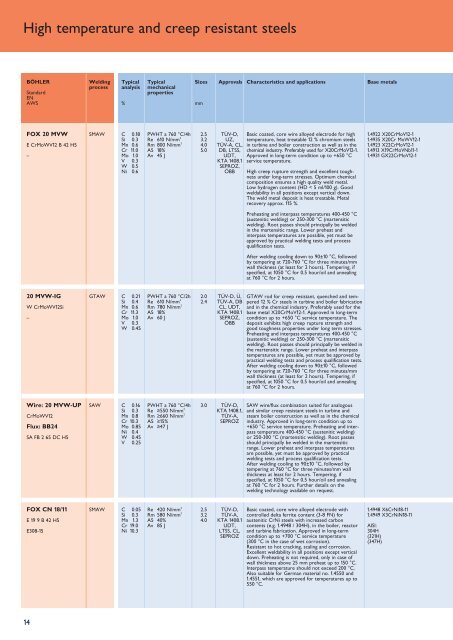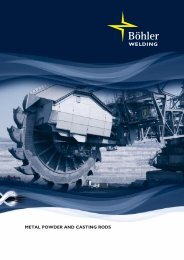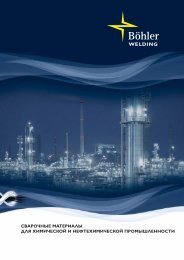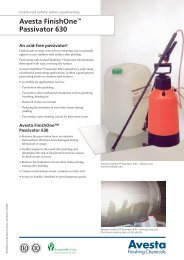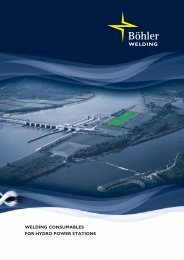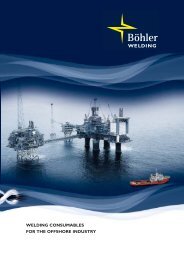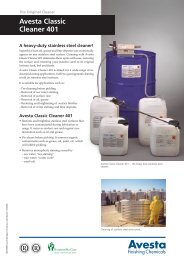WELDING Consumables for thermal power stations
WELDING Consumables for thermal power stations
WELDING Consumables for thermal power stations
Create successful ePaper yourself
Turn your PDF publications into a flip-book with our unique Google optimized e-Paper software.
High temperature and creep resistant steels<br />
BÖHLER<br />
Standard<br />
EN<br />
AWS<br />
Welding<br />
process<br />
Typical<br />
analysis<br />
%<br />
Typical<br />
mechanical<br />
properties<br />
Sizes<br />
mm<br />
Approvals<br />
Characteristics and applications<br />
Base metals<br />
FOX 20 MVW<br />
E CrMoWV12 B 42 H5<br />
–<br />
SMAW C 0.18<br />
Si 0.3<br />
Mn 0.6<br />
Cr 11.0<br />
Mo 1.0<br />
V 0.3<br />
W 0.5<br />
Ni 0.6<br />
PWHT a 760 °C/4h<br />
Re 610 N/mm 2<br />
Rm 800 N/mm 2<br />
A5 18%<br />
Av 45 J<br />
2.5<br />
3.2<br />
4.0<br />
5.0<br />
TÜV-D,<br />
UZ,<br />
TÜV-A, CL,<br />
DB, LTSS,<br />
UDT,<br />
KTA 1408.1<br />
SEPROZ,<br />
ÖBB<br />
Basic coated, core wire alloyed electrode <strong>for</strong> high<br />
temperature, heat treatable 12 % chromium steels<br />
in turbine and boiler construction as well as in the<br />
chemical industry. Preferably used <strong>for</strong> X20CrMoV12-1.<br />
Approved in long-term condition up to +650 °C<br />
service temperature.<br />
High creep rupture strength and excellent toughness<br />
under long-term stresses. Optimum chemical<br />
composition ensures a high quality weld metal.<br />
Low hydrogen content (HD < 5 ml/100 g). Good<br />
weldability in all positions except vertical down.<br />
The weld metal deposit is heat treatable. Metal<br />
recovery approx. 115 %.<br />
1.4922 X20CrMoV12-1<br />
1.4935 X20Cr MoWV12-1<br />
1.4923 X22CrMoV12-1<br />
1.4913 X19CrMoVNb11-1<br />
1.4931 GX22CrMoV12-1<br />
Preheating and interpass temperatures 400-450 °C<br />
(austenitic welding) or 250-300 °C (martensitic<br />
welding). Root passes should principally be welded<br />
in the martensitic range. Lower preheat and<br />
interpass temperatures are possible, yet must be<br />
approved by practical welding tests and process<br />
qualification tests.<br />
After welding cooling down to 90±10 °C, followed<br />
by tempering at 720-760 °C <strong>for</strong> three minutes/mm<br />
wall thickness (at least <strong>for</strong> 2 hours). Tempering, if<br />
specified, at 1050 °C <strong>for</strong> 0.5 hour/oil and annealing<br />
at 760 °C <strong>for</strong> 2 hours.<br />
20 MVW-IG<br />
W CrMoWV12Si<br />
–<br />
GTAW C 0.21<br />
Si 0.4<br />
Mn 0.6<br />
Cr 11.3<br />
Mo 1.0<br />
V 0.3<br />
W 0.45<br />
PWHT a 760 °C/2h<br />
Re 610 N/mm 2<br />
Rm 780 N/mm 2<br />
A5 18%<br />
Av 60 J<br />
2.0<br />
2.4<br />
TÜV-D, Ü,<br />
TÜV-A, DB<br />
CL, UDT,<br />
KTA 1408.1<br />
SEPROZ,<br />
ÖBB<br />
GTAW rod <strong>for</strong> creep resistant, quenched and tempered<br />
12 % Cr steels in turbine and boiler fabrication<br />
and in the chemical industry. Preferably used <strong>for</strong> the<br />
base metal X20CrMoV12-1. Approved in long-term<br />
condition up to +650 °C service temperature. The<br />
deposit exhibits high creep rupture strength and<br />
good toughness properties under long term stresses.<br />
Preheating and interpass temperatures 400-450 °C<br />
(austenitic welding) or 250-300 °C (martensitic<br />
welding). Root passes should principally be welded in<br />
the martensitic range. Lower preheat and interpass<br />
temperatures are possible, yet must be approved by<br />
practical welding tests and process qualification tests.<br />
After welding cooling down to 90±10 °C, followed<br />
by tempering at 720-760 °C <strong>for</strong> three minutes/mm<br />
wall thickness (at least <strong>for</strong> 2 hours). Tempering, if<br />
specified, at 1050 °C <strong>for</strong> 0.5 hour/oil and annealing<br />
at 760 °C <strong>for</strong> 2 hours.<br />
Wire: 20 MVW-UP<br />
CrMoWV12<br />
Flux: BB24<br />
SA FB 2 65 DC H5<br />
SAW C 0.16<br />
Si 0.3<br />
Mn 0.8<br />
Cr 10.3<br />
Mo 0.85<br />
Ni 0.4<br />
W 0.45<br />
V 0.25<br />
PWHT a 760 °C/4h<br />
Re ≥550 N/mm 2<br />
Rm ≥660 N/mm 2<br />
A5 ≥15%<br />
Av ≥47 J<br />
3.0 TÜV-D,<br />
KTA 1408.1,<br />
TÜV-A,<br />
SEPROZ<br />
SAW wire/flux combination suited <strong>for</strong> analogous<br />
and similar creep resistant steels in turbine and<br />
steam boiler construction as well as in the chemical<br />
industry. Approved in long-term condition up to<br />
+650 °C service temperature. Preheating and interpass<br />
temperature 400-450 °C (austenitic welding)<br />
or 250-300 °C (martensitic welding). Root passes<br />
should principally be welded in the martensitic<br />
range. Lower preheat and interpass temperatures<br />
are possible, yet must be approved by practical<br />
welding tests and process qualification tests.<br />
After welding cooling to 90±10 °C, followed by<br />
tempering at 760 °C <strong>for</strong> three minutes/mm wall<br />
thickness at least <strong>for</strong> 2 hours. Tempering, if<br />
specified, at 1050 °C <strong>for</strong> 0.5 hour/oil and annealing<br />
at 760 °C <strong>for</strong> 2 hours. Further details on the<br />
welding technology available on request.<br />
FOX CN 18/11<br />
E 19 9 B 42 H5<br />
E308-15<br />
SMAW C 0.05<br />
Si 0.3<br />
Mn 1.3<br />
Cr 19.0<br />
Ni 10.3<br />
Re 420 N/mm 2<br />
Rm 580 N/mm 2<br />
A5 40%<br />
Av 85 J<br />
2.5<br />
3.2<br />
4.0<br />
TÜV-D,<br />
TÜV-A,<br />
KTA 1408.1<br />
UDT,<br />
LTSS, CL,<br />
SEPROZ<br />
Basic coated, core wire alloyed electrode with<br />
controlled delta ferrite content (3-8 FN) <strong>for</strong><br />
austenitic CrNi steels with increased carbon<br />
contents (e.g. 1.4948 / 304H), in the boiler, reactor<br />
and turbine fabrication. Approved in long-term<br />
condition up to +700 °C service temperature<br />
(300 °C in the case of wet corrosion).<br />
Resistant to hot cracking, scaling and corrosion.<br />
Excellent weldability in all positions except vertical<br />
down. Preheating is not required, only in case of<br />
wall thickness above 25 mm preheat up to 150 °C.<br />
Interpass temperature should not exceed 200 °C.<br />
Also suitable <strong>for</strong> German material no. 1.4550 and<br />
1.4551, which are approved <strong>for</strong> temperatures up to<br />
550 °C.<br />
1.4948 X6CrNi18-11<br />
1.4949 X3CrNiN18-11<br />
AISI:<br />
304H<br />
(321H)<br />
(347H)<br />
14


